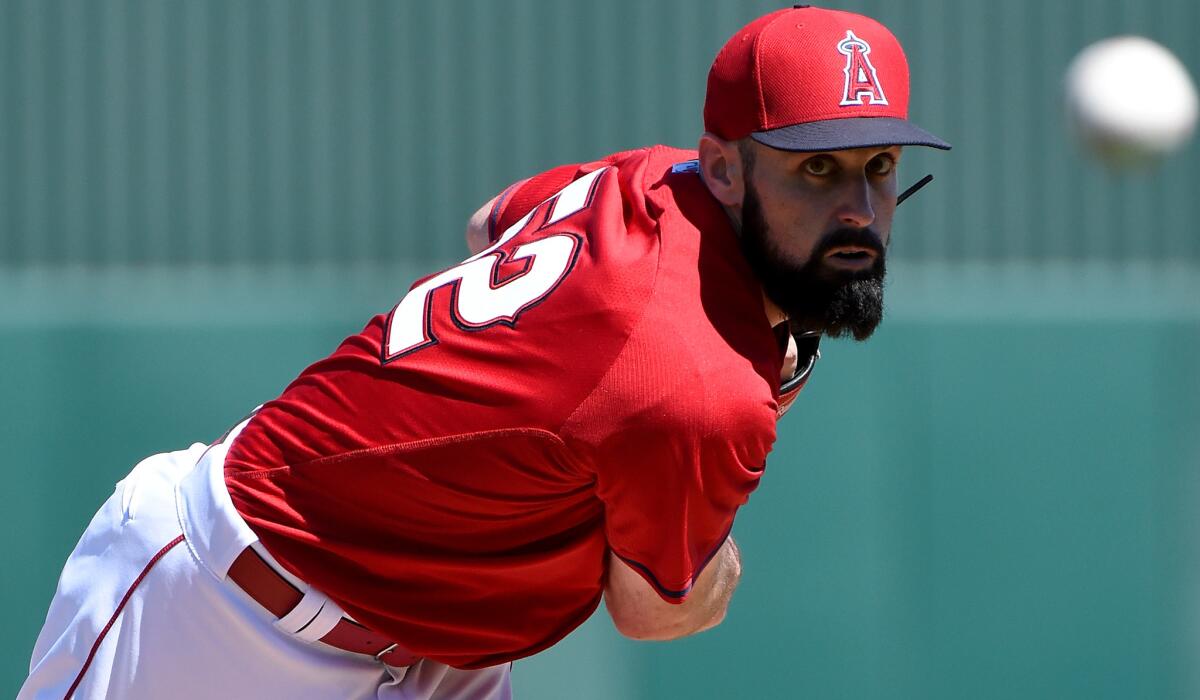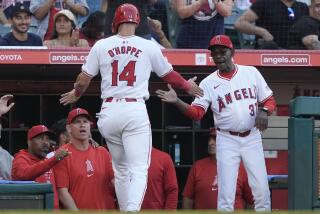Angels pitcher Matt Shoemaker’s toil in minors was worth the trouble

- Share via
Reporting from Tempe, Ariz. — Matt Shoemaker walked into the Angels’ spring-training clubhouse in February, and there among the five corner lockers reserved for established major league starting pitchers was a cubicle with his name and No. 52 above it.
If there was a soundtrack to accompany the moment, it would have been the “Hallelujah Chorus.”
Shoemaker was not even drafted after his junior season at Eastern Michigan in 2008 and signed as a free agent for $10,000.
He toiled in the minor leagues for six years, earning less in a six-month season than he did as a substitute teacher over the winter. He drove a 2001 Ford Taurus for a decade because he couldn’t afford a new car.
Outside of his 2011 season at double A, when he was named Texas League pitcher of the year, Shoemaker did little to pique the interest of the front office.
Then came his breakout 2014 season, when Shoemaker seized a rotation spot in May and went 16-4 with a 3.04 earned-run average, striking out 124 and walking 24 in 136 innings, to help the Angels win the American League West.
The bearded right-hander finished second in AL rookie-of-the-year voting and pitched well in a playoff loss to Kansas City. His contributions to an injury-ravaged rotation were so meaningful that Manager Mike Scioscia called him a “savior.”
Shoemaker, 28, arrived at camp with a rotation spot — and a salary of $517,500 — assured. It’s a paltry sum compared to locker mate Jered Weaver, who will make $18.2 million, but Shoemaker called it “astronomical in the big picture.”
His wife, Danielle, who worked as a paralegal while Matt pursued a baseball career, could quit her job and focus on the couple’s infant son, Brady, born Jan. 8.
Shoemaker could have stood in the clubhouse that February day and basked in the moment, but if there was a song in his head it wasn’t that baroque-period piece from Handel’s “Messiah.” It was “Work to Do,” from the Average White Band.
“It’s definitely an honor being placed with guys like Weaver and Garrett Richards, and it’s a testament to my perseverance,” Shoemaker said. “But my thought process is still the same. I have to work hard and keep getting better so I can stay here for another 10 years.”
In a sport driven in large part by ego, Shoemaker is as even-keeled and unassuming as they come.
“In 26 years of being around professional baseball, there are very few guys who are as humble in the way they’re wired as Matt Shoemaker,” Angels General Manager Jerry Dipoto said. “To have the success he had last year and to maintain the same generally grounded place in life is so refreshing. It’s not common.”
::
Joel Murrie is the northern Midwest supervisor of scouting for the Angels. “If there’s cornfields or ice, I cover that area,” he said.
Scouting in the Midwest and the North is difficult because “you’re battling the elements,” Murrie said. “When it’s too cold to take notes, how tough is it for a pitcher to grip a slider?”
Shoemaker was on Murrie’s radar in 2007 when, as a sophomore, he led the Mid-American Conference in saves. But Shoemaker slipped on a patch of ice and broke his left arm the January before his junior year and got off to a slow start in 2008.
His fastball velocity dipped to about 85 mph, and his command was off. Shoemaker’s ERA rose to 4.47 against middling competition, and he fell off the scouting grid.
Several teams called Shoemaker before the June draft to say they might pick him, but 50 rounds passed and he was not among the 1,504 players selected.
“That was one of toughest days we’ve ever had in our household,” said David Shoemaker, Matt’s father. “Matt was watching the draft on his laptop, the last pick was announced, and I heard his laptop close. I gave him a hug, told him I was sorry. He didn’t understand what happened.”
Shoemaker had earned his college degree and wanted to move on to pro ball. “It’s tough to put words to it,” he said. “. . . It was almost like two days of depression.”
About a month later, Murrie went to dinner with a few coaches after scouting a summer-league tournament in Michigan. The Angels needed arms to ease the workload of some prospects at the lower levels, and Murrie asked the coaches if they knew of anyone looking for a job.
Sitting next to Murrie was Todd Coryell, then an Eastern Michigan assistant, who told Murrie that Shoemaker wanted to sign.
“I called Matt and asked if he was interested,” Murrie said. “I said, ‘What are you looking for?’ He said, ‘$30,000.’ I told him we’re pretty far apart. He said, ‘By how much?’ I said, ‘$30,000.’”
The Angels continued to scout Shoemaker in a summer league, and Murrie was later authorized to offer $10,000. Shoemaker jumped at it.
“In a nutshell, I was in the right place at the right time,” Murrie said. “I had a friend who had information on a guy, and our player-development staff stuck with him. My part was easy. The rest is what Matt has done.”
Murrie, 61, reflected as he watched Shoemaker pitch against the Chicago White Sox in Anaheim last June.
“It makes all those days in the cold weather worth it,” Murrie said. “As a scout, there’s no better feeling than when you sign a kid and see him overcome the odds. Someone asked me how tough it is for a free agent to make the big leagues. It’s tough for a first-round pick to make it.”
::
The 6-foot-2 Shoemaker reported to camp this spring looking gaunt. He had lost 30 pounds.
There was no cause for alarm. “I do that before every spring and gain it back during the year,” he said. “I’ve done it for seven years.”
Who knew? No one paid much attention to Shoemaker until 2014. His career seemed to plateau at triple-A Salt Lake, where he spent 2012 and 2013, save for a spot-start with the Angels in September 2013.
“He did things along the way that were kind of screaming to be noticed,” Dipoto said, “but nobody did.”
That changed last May, when Shoemaker — who’d been sent to Salt Lake after three April relief appearances with the Angels — was called up to replace the struggling Hector Santiago in the rotation. He beat Philadelphia and Tampa Bay in his first two starts and won his first five decisions as a starter.
His confidence grew, and questions were raised. How was a guy who went 22-23 with a 5.14 ERA in two seasons at Salt Lake making such a smooth transition to the big leagues.
“I didn’t change that much,” Shoemaker said. “I don’t know if there’s an explanation.”
Getting beat up in the altitude of Salt Lake and the hitter-friendly parks of the Pacific Coast League may have helped. It forced Shoemaker to keep his pitches down, locate better and rely less on his split-fingered fastball.
“As weird as it sounds, it’s almost good to pitch in the PCL because it’s so tough,” Shoemaker said. “The best pitcher in the world is going to have a good amount of failure there. It makes you think, what can I do to get better?”
Shoemaker was the AL pitcher of the month for August, when he went 6-1 with a 1.31 ERA.
He had a 6-1 record with a 1.92 ERA in nine starts last season against former All-Star starters such as David Price, Chris Sale and Justin Verlander. Shoemaker also had the 12th-best strikeout-to-walk ratio — 5.17-to-1 — among major league starters, and his WHIP (walks plus hits per inning) of 1.07 was tied for 11th. He gave nine homers in his starts.
“His strikeout rate was high, his walk rate was low, and he generally suppressed home runs,” Dipoto said. “He threw a high percentage of strikes, missed a high percentage of bats and did not give away many free runners.”
Shoemaker was also dominant in what Dipoto called “the most important game of our season.” It came on Aug. 21, in Fenway Park, the night after Richards, the team’s best starter, suffered a season-ending knee injury.
Shoemaker had a no-hitter broken up with two outs in the seventh inning of a 2-0 win that completed a four-game sweep.
“We could have tucked our tails between our legs because we just lost the guy who was having a Cy Young-quality season,” Dipoto said. “In that moment, Shoe picked us up and said, ‘Guys, this is going to be OK.’
“I’ll never forget how somber the clubhouse felt the night Garrett was hurt and how upbeat and excited everyone was the next night.”
Life is a little different for Shoemaker now. For starters, he sold his Taurus, which he said “looked very out of place” in a players’ lot filled with luxury cars. He hasn’t replaced it yet, but is thinking more Jeep Grand Cherokee or Chevy Tahoe than sports car.
And now there are expectations to replicate his superb rookie season, which could bring added pressure.
“Shoe doesn’t have to be any different than he already is,” Dipoto said. “He throws hard enough. He has an out pitch with the split-finger. He has two breaking balls he can locate on both sides of the plate, and he has the courage to throw strikes. Those are the elements you need.”
He also has a track record of success, even if it’s just one lap around the big leagues.
“What Matt did last year was for real; it wasn’t a fluke,” Scioscia said. “He made believers of a lot of people, including myself. His stuff plays well. He just needed an opportunity to pitch.”
Twitter: @MikeDiGiovanna
More to Read
Go beyond the scoreboard
Get the latest on L.A.'s teams in the daily Sports Report newsletter.
You may occasionally receive promotional content from the Los Angeles Times.







